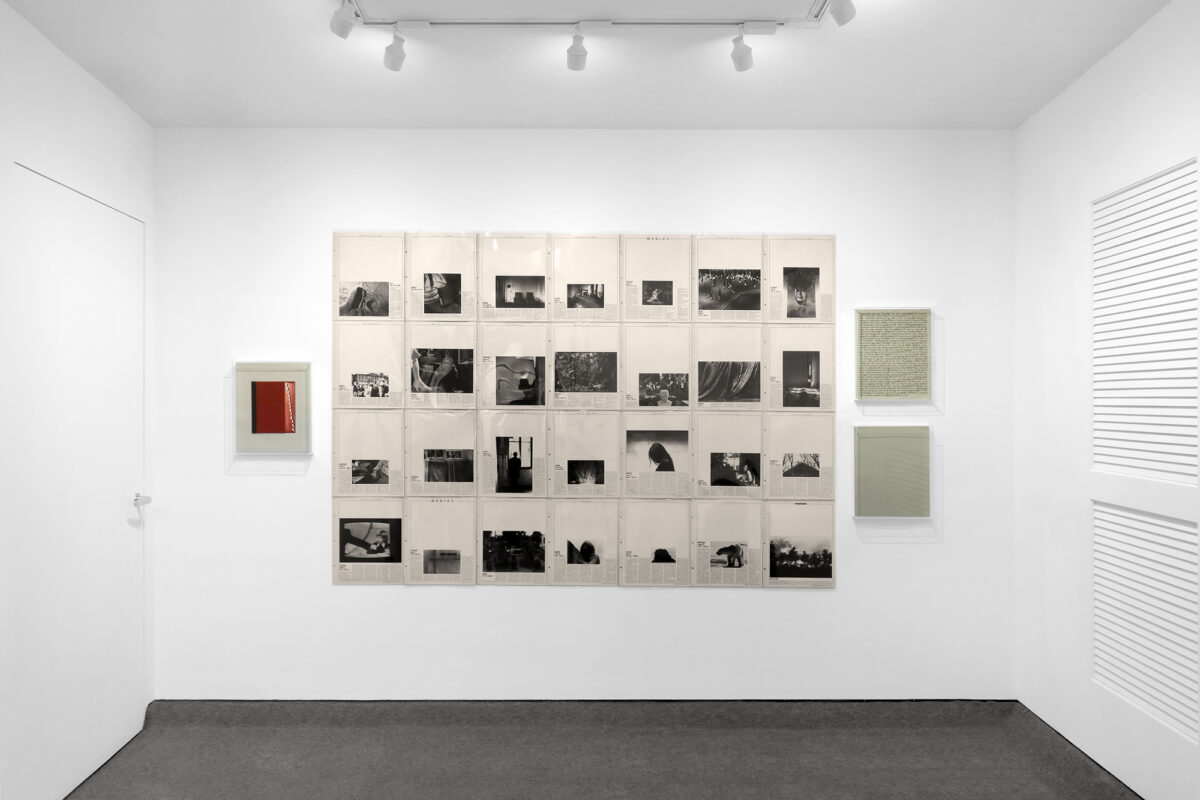
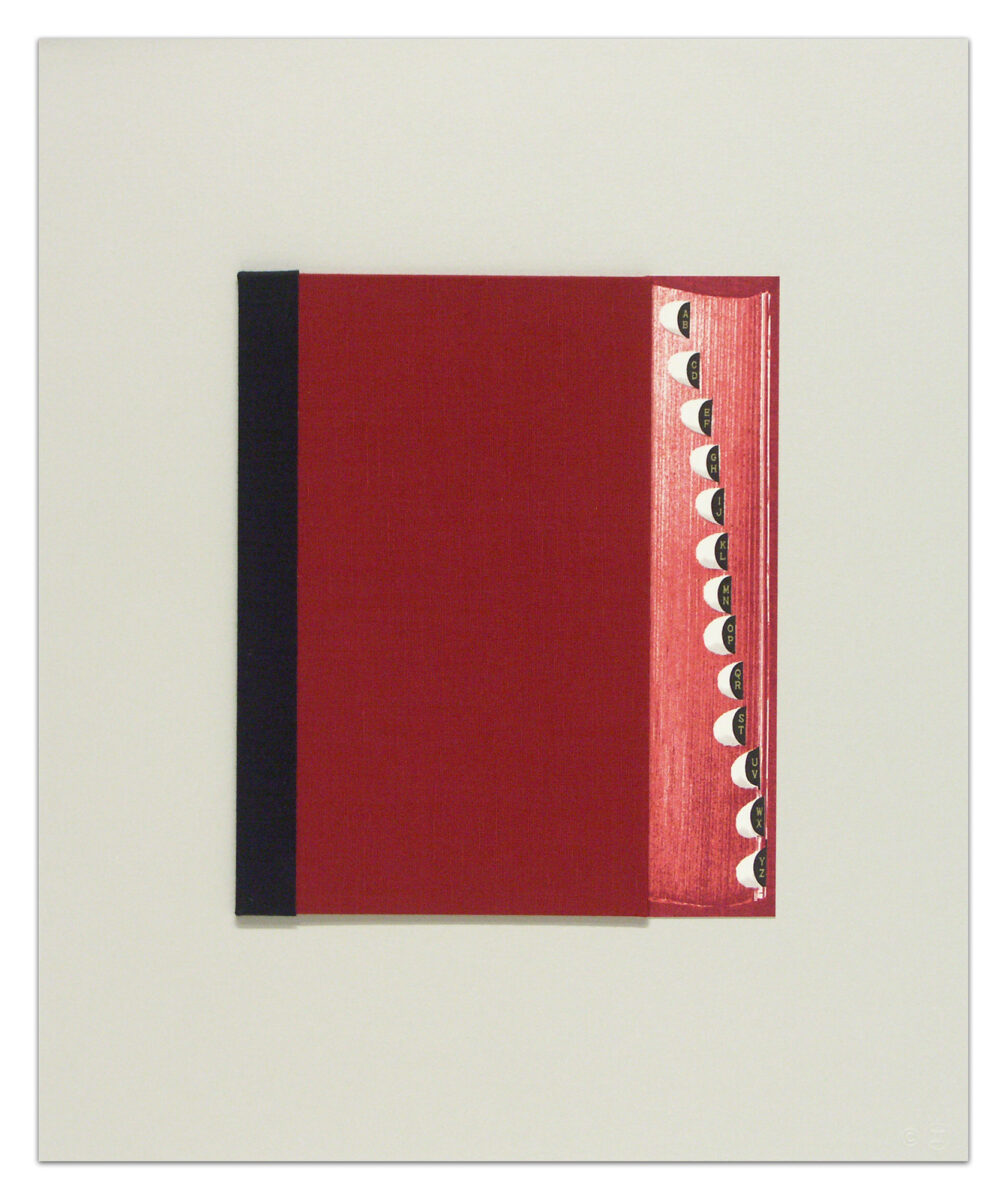
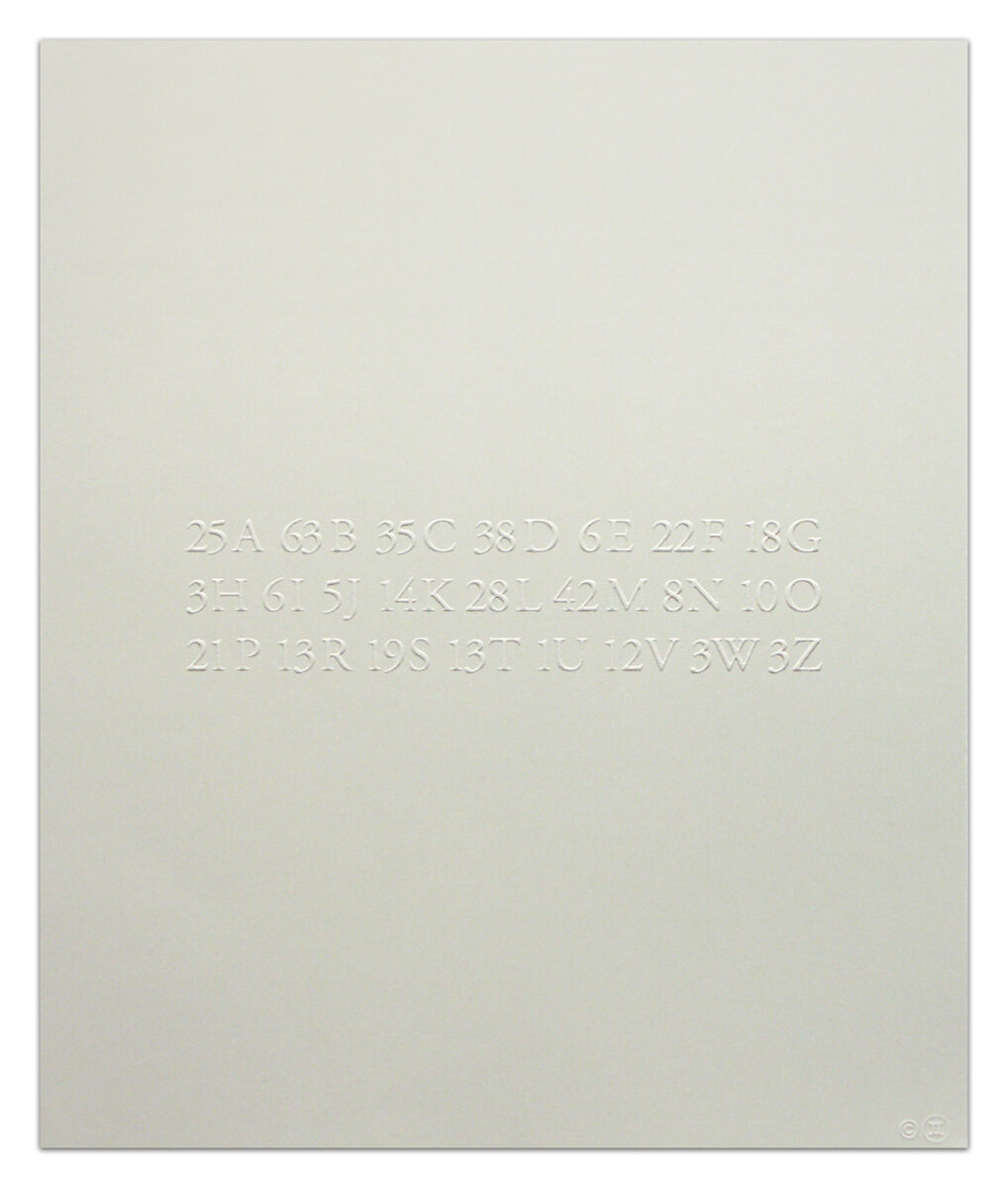
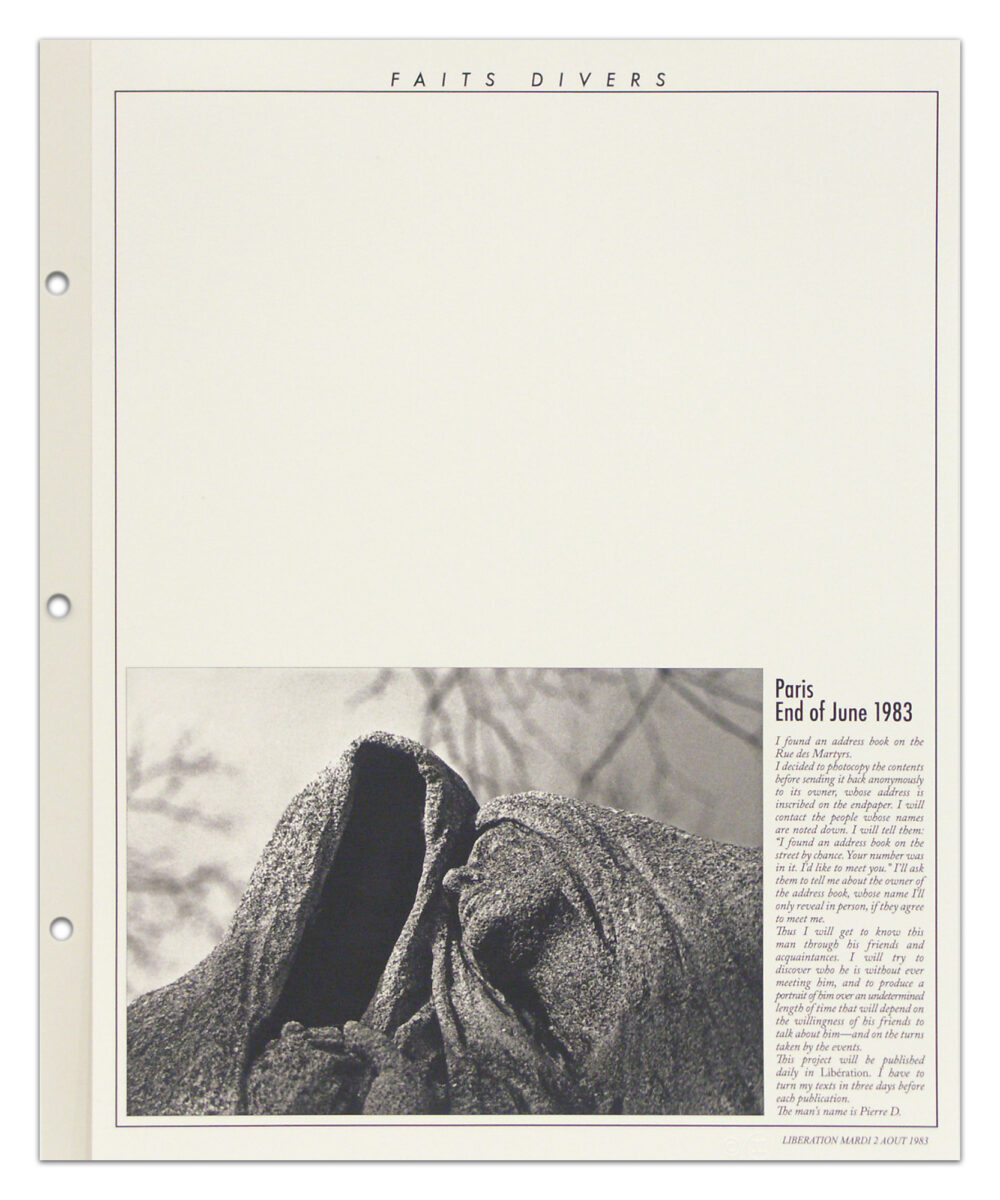
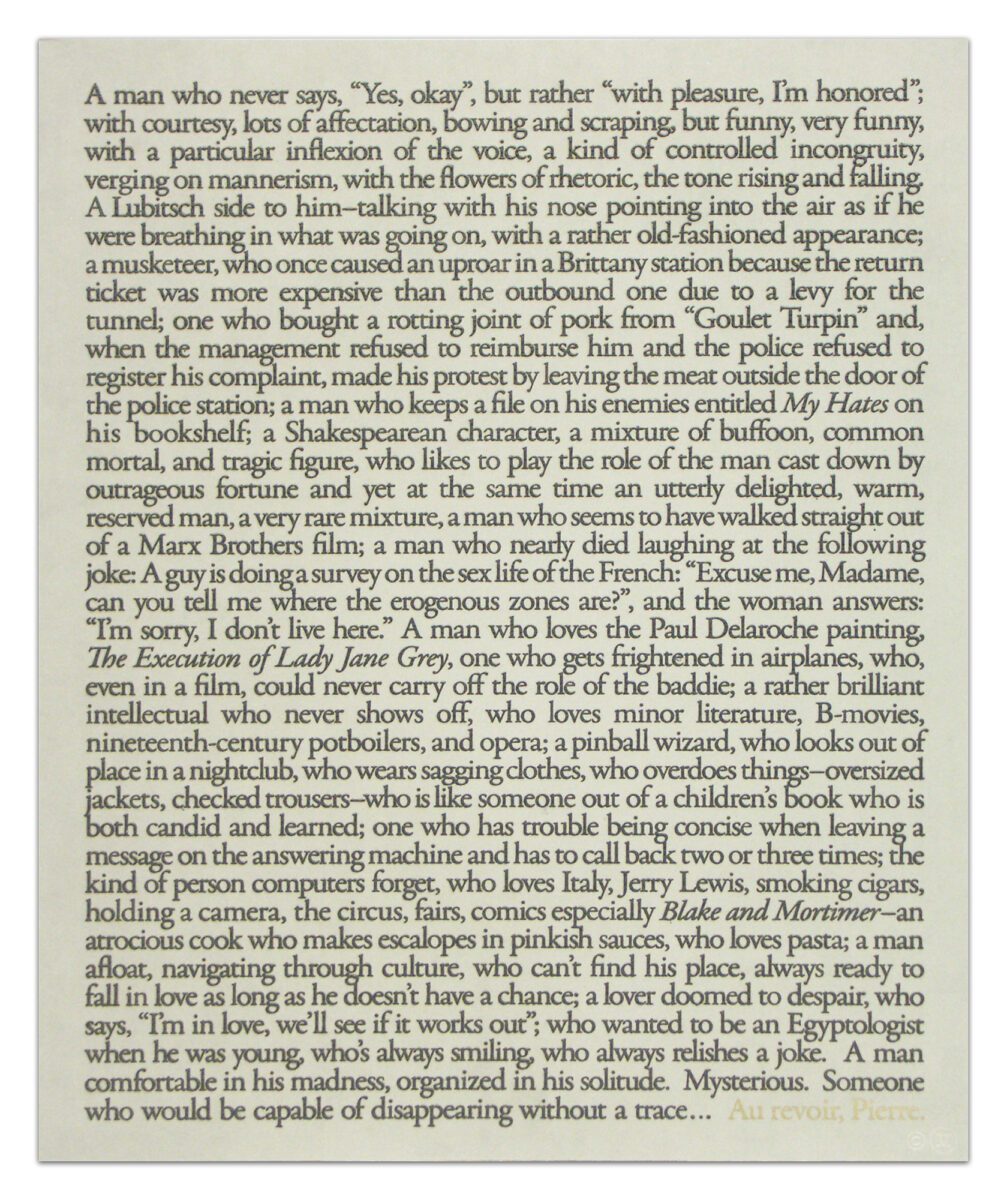
Edition of 45
Print size (approximately): 15 x 12 1/2 inches each (38.1 x 31.75 cm each)
Sleeve size: 14 7/8 x 11 3/8 inches each (37.8 x 29 cm each)
Binder size: 15 1/2 x 14 x 1 3/4 inches (39.4 x 35.5 x 4.4 cm)
Signed and dated lower right, numbered lower left on second row, last sheet colophon
(Inventory #31881)
Exhibited September 10, 2022 – October 15, 2022
Edition of 45
Print size (approximately): 15 x 12 1/2 inches each (38.1 x 31.75 cm each)
Sleeve size: 14 7/8 x 11 3/8 inches each (37.8 x 29 cm each)
Binder size: 15 1/2 x 14 x 1 3/4 inches (39.4 x 35.5 x 4.4 cm)
Signed and dated lower right, numbered lower left on second row, last sheet colophon
(Inventory #31881)
Exhibited September 10, 2022 – October 15, 2022
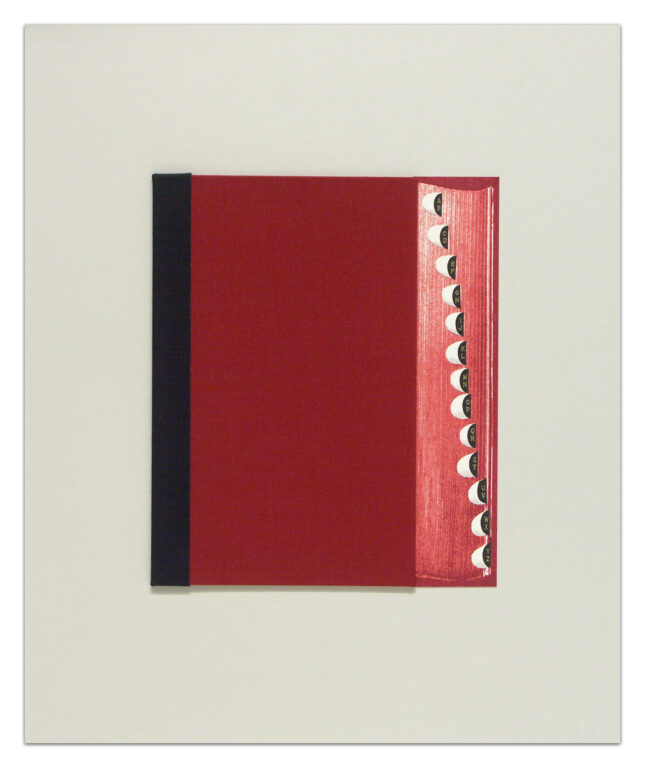
“A remarkably poignant and tender portrait of a man she would never meet.”
Mary Kaye Schilling
“I found an address book on the Rue des Martyrs.
I decided to photocopy the contents before sending it back anonymously to its owner, whose address is inscribed on the endpaper. I will contact the people whose names are noted down. I will tell them, “I found an address book on the street by chance. Your number was in it. I’d like to meet you.” I’ll ask them to tell me about the owner of the address book, whose name I’ll only reveal in person, if they agree to meet me.
Thus, I will get to know this man through his friends and acquaintances. I will try to discover who he is without ever meeting him, and I will try to produce a portrait of him over an undetermined length of time that will depend on the willingness of his friends to talk about him—and on the turns taken by the events.
This project will be published daily in Libération. I have to turn my texts in three days before each publication.
The man’s name is Pierre D.”
Sophie Calle, “Libération”, Tuesday, August 2, 1983
Originally published as a serial in the newspaper, “Libération,” over the course of one month, Calle’s incisive written accounts with friends, family, and colleagues, juxtaposed with photographs, yield vivid subjective impressions of the address book’s owner, Pierre D., while also suggesting ever more complicated stories as information is parsed and withheld by the people she encounters. Collaged through a multitude of details–from the banal to the luminous, this fragile and strangely intimate portrait of Pierre D. is a prism through which to see the desire for, and the elusiveness of, knowledge. Upon learning of this work and its publication in the newspaper, Pierre D. expressed his anger, and Calle agreed not to republish the work until after his death, which he accepted, and thus, only in 2009 did Calle create the work that is currently on exhibition. The project presented consists of images of each episode as it was laid out in the newspaper, but now absent of all surrounding context. The stories are isolated except by three additional objects. Exhibited to one side of the narratives is a sculptural, five-color lithograph with book cloth that references the physical object of the address book. On the other side are a blind-embossed (the numbers are visible but un-inked) list of all the interviewee’s addresses and a crisply etched, textual portrait summarizing the collective portrait of Pierre D. as described by the interviewees/entries in the address book. The exhibited project is a poetic collection both visually and textually, documenting a process of discovery that drifts between anonymity, transparency, presence, and dislocation.
Born
Paris, France, 1953
French conceptual artist Sophie Calle has redefined through personal investigation the terms and parameters of subject/object, the public versus the private, and role-playing. In her conceptual projects, Calle immerses herself in examinations of voyeurism, intimacy and identity. Calle’s “method” of dealing with the suffering the world throws at her is to see it all as a game of chance and coincidence, a ritual ripe for exposure on a wall.
The daughter of a doctor who collected pop art and a press officer mother, Calle never went to art school. She keeps no sketchbooks. “Ideas just come to me,” she has said. After completing her schooling, Calle took off to travel the world for seven years. When she came back to Paris in 1979, she began following and photographing strangers as a way to become reacquainted with the city and its people. In the process of secretly investigating, reconstructing or documenting strangers’ lives, Calle manipulates situations and individuals, and often adopts guises. Calle is fascinated by the interface between our public lives and our private selves. This has led her to investigate patterns of behavior using techniques akin to those of a private investigator, a psychologist, or a forensic scientist. It has also led her to investigate her own behavior so that her life, as lived and as imagined, has informed many of her most interesting works. Calle’s projects, with their suggestions of intimacy, also questioned the role of the spectator; viewers often feel a sense of unease as they became the unwitting collaborators in these violations of privacy. Moreover, the deliberately constructed and thus in one sense artificial nature of the documentary ‘evidence’ used in Calle’s work questioned the nature of all truths.
Calle’s work has been shown at the 1990 Sydney Biennial and the 1993 Biennial Exhibition of the Whitney Museum of American Art, New York, and has been included in exhibitions at the Musee d’art Moderne de la Ville de Paris; De Appel, Amsterdam; the Whitechapel Art Gallery, London; The Clocktower and The Museum of Modern Art, New York; Carnegie Museum of Art, Pittsburgh; Museum of Fine Arts, Boston; Hayward Gallery, London; Museum of Contemporary Art, Chicago; Centre Georges Pompidou, Paris; the Serpentine Gallery, London, and Tel Aviv Museum of Art, Israel. In
2007, Calle showed in French Pavillion at the Venice Biennale. Her exhibit, entitled “Take Care of Yourself”, named after the last line of the message her ex had left her, won her international critical acclaim.
Calle currently lives and works in Paris, France.
10 Newbury Street, Boston, Massachusetts 02116
617-262-4490 | info@krakowwitkingallery.com
The gallery is free and open to the public Tuesday – Saturday, 10am – 5:30pm